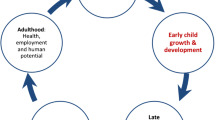Abstract
Objectives
To compare development/cognition, adaptive function and maladaptive behavior of HIV-infected and HIV-exposed uninfected children between 2 to 9 years with HIV-uninfected controls.
Methods
This hospital-based cross-sectional study was conducted from November, 2013 to March, 2015. 50 seropositive HIV-infected, 25 HIV-exposed uninfected and 25 HIV-uninfected children between 2 to 9 years were administered Developmental Profile 3, Vineland Adaptive Behavior Scale 2, and Child Behavior Checklist for assessing development, adaptive function and maladaptive behaviour, respectively. Additional data were obtained by history, examination and review of records.
Results
Significant developmental/cognitive impairment was observed in 38 (76%), 16 (64%) and 6 (24%) HIV-infected, HIV-exposed uninfected, and HIV-uninfected children, respectively. Significant impairment in adaptive function was found in 12 (24%) and 2 (8%) HIV-infected and HIV-exposed uninfected children, respectively. Maladaptive behavior was not seen in any group.
Conclusions
High magnitude of impaired development/cognition and adaptive function in HIV-exposed and HIV-infected children warrants assessment of these domains during follow-up of these children, and incorporation of interventions for these deficits in standard care for this group.
Similar content being viewed by others
References
Fiegelman S. Overview of assessment and variability: Growth, development and behavior. In: Kliegmen RM, Stanton BF, St Geme III JW, eds. Nelson Textbook of Pediatrics. 20th ed. Philadelphia: Elsevier; 2016. p. 48–51.
Bass JK, Nakasujja N, Familiar-Lopez I, Sikorskii A, Murray SM, Opoka R, et al. Association of caregiver quality of care with neurocognitive outcomes in HIV affected children aged 2–5 years in Uganda. AIDS Care. 2016;28:76–83.
Coscia JM, Christensen BK, Henry RR, Wallston K, Radcliffe J, Rutstein R. Effects of home environment, socioeconomic status, and health status on cognitive functioning in children with HIV-1 infection. J Pediatr Psychol. 2001;26:321–9.
Smith R, Chernoff M, Williams PL, Malee KM, Sirios PA, Kammerer B, et al. Impact of HIV severity on cognitive and adaptive functioning during childhood and adolescence. Pediatr Infect Dis J. 2012;31:592–8.
Puthanakit T, Aurpibul L, Louthrenoo O, Tapanya P, Nadsasarn R, Inseeard S, et al. Poor cognitive functioning of school-aged children in Thailand with perinatally acquired HIV infection taking antiretroviral therapy. AIDS Patient Care STDS. 2010;24:141–6.
Brahmbhatt H, Boivin M, Ssempijja V, Kigozi G, Kagaayi J, Serwadda D, et al. Neurodevelopmental benefits of Anti- Retroviral Therapy in Ugandan children 0–6 Years of age with HIV. J Acquir Immune Defic Syndr. 2014;67:316–22.
Laughton B, Cornell M, Boivin M, Van-Rie A. Neurodevelopment in perinatally HIV-infected children: a concern for adolescence. J Int AIDS Soc. 2013;16:18603.
Grover G, Pensi T, Banerjee T. Behavioural disorders in 6- 11-year-old, HIV-infected Indian children. Ann Trop Paediatr. 2007;27:215–24.
Joshi D, Tiwari MK, Kannan V, Dalal SS, Mathai SS. Emotional and behavioural disturbances in school going HIV positive children attending HIV clinic. Med J Armed Forces India. 2017;73:18–22.
Gerald D. Developmental Profile, 3rd ed. Los Angeles, CA: Western Psychological Services; 2007.
Sparrow S, Cicchetti DV, Balla D. Vineland adaptive behavior scale, 2nd ed. San Antonia: Pearson Assessment; 2005.
Achenbach TM, Rescorta LA. Manual for the ASEBA school age forms and profiles. Burlington, VY: University of Vermont; 2001.
Black MM, Walker SP, Fernald LCH, Anderson CT, DiGirolomo AM, Chunling L, et al. Early childhood development coming of age: Science through the life course. Lancet. 2017;389:77–90.
Nozyce M, Lee S, Wiznia A, Nachman S, Mofenson L, Smith M, et al. A behavioral and cognitive profile of clinically stable and HIV infected children. Pediatrics. 2006;117:763–70.
Boyede GO, Lesi FEA, Ezeaka VC, Umeh CS. The influence of clinical staging and use of antiretroviral therapy on cognitive functioning of school aged Nigerian children with HIV infection. J AIDS Clin Res. 2013;4:195.
Malee KM, Tassiopoulos K, Huo Y, Siberry G, Williams PL, Hazra, R, et al. Mental health functioning among children and adolescents with perinatal HIV infection and perinatal HIV exposure. AIDS Care. 2011;23:1533–44.
Martin SC, Wolters PL, Toledo-Tamula MA, Zeichner SL, Hazra R, Civitello L. Cognitive functioning in school aged children with vertically acquired HIV infection being treated with Highly active antiretroviral therapy (HAART). Dev Neuropsychol. 2006;30:633–57.
Gadow KD, Chernoff M, Williams PL, Brouwers P, Morse E, Heston J. Co-occurring psychiatric symptoms in children perinatally infected with HIV and peer comparison sample. J Dev Behav Pediatr. 2010;31:116–28.
Gosling A, Burns J, Hirst F. Children with HIV in the UK: A longitudinal study of adaptive and cognitive functioning. Clin Child Psychol Psychiatry. 2004;9:25–37.
National AIDS Control Organization. NACO Annual Report 2013–14. Available from: http://naco.gov.in/documents/annual-reports. Accessed December 27, 2015.
Funding
Funding: None; Competing interests: None stated.
Author information
Authors and Affiliations
Contributions
Contributors: SBM,AS: conceptualized the study and will stand as guarantors; SD,SBM: did the literature search; SD: was trained to administer the psychometric tools by SBM and SS and collected the data; SBM,SD,SS: interpreted and analyzed the data; SM: drafted the manuscript which underwent a critical appraisal by SD,AS,SS. All the authors approved the final manuscript and agree to be accountable for all aspects of the work in ensuring that questions related to the accuracy or integrity of any part of the work are appropriately investigated and resolved.
Corresponding author
Rights and permissions
About this article
Cite this article
Mukherjee, S.B., Devamare, S., Seth, A. et al. Development, Cognition, Adaptive Function and Maladaptive Behavior in HIV-infected and HIV-exposed Uninfected Children Aged 2–9 Years. Indian Pediatr 56, 933–937 (2019). https://doi.org/10.1007/s13312-019-1650-z
Received:
Revised:
Accepted:
Published:
Issue Date:
DOI: https://doi.org/10.1007/s13312-019-1650-z




